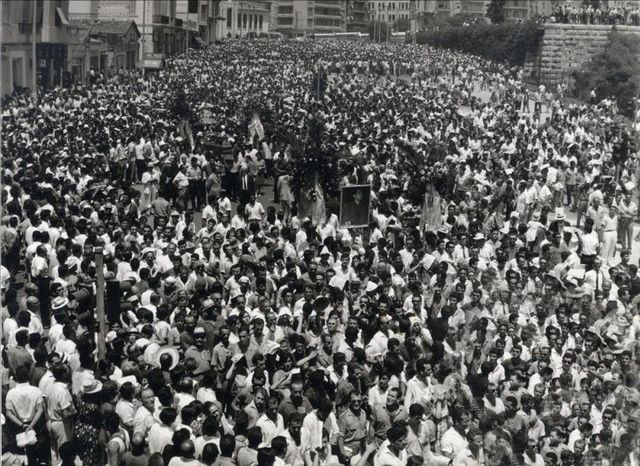WORLD SOCIALIST WEB SITE
 Demonstration in Greece, 1965
Demonstration in Greece, 1965
On July 21, 1965, police in Athens attacked a crowd, estimated by western media at 10,000, demonstrating for the reinstatement of former Prime Minister Georgios Papandreou. King Constantine II removed Papandreou from office on July 15, 1965 claiming the Center Union Party premier had promoted leftism in the military. One man, Sotirias Petrouslas, 25, was killed and at least 130 were injured, along with dozens of tourists, in the police riot. About 100 were arrested.
The crowd of 10,000 had splintered off from a larger mass rally in favor of Papandreou’s reinstatement and the ouster of replacement Prime Minister Athanasiadis-Novas, also a member of Papandreou’s Center Union Party. Minister of Public Order Ioannis Toumbas claimed the demonstrators refused police orders to disperse, and then attacked police. He laid blame for the “disturbance” at the feet of Papandreou, whom he accused, in a nationally broadcast address, of “rabble-rousing.” The demonstrations, which began immediately after Papandreou’s ouster, continued. The General Confederation of Labor announced a 24-hour nationwide general strike for July 27, the following Tuesday.
The July 1965 events are known in Greece as the “the Royal Coup.” Papandreou’s Center Union Party was based on an uneasy combination of liberal and social democratic forces that balanced between the social aspirations of the Greek masses and the most reactionary elements of society grouped around the crown and the military. After winning the elections of 1963 and 1964—the latter by a wide margin—Papandreou sought to consolidate his own power and at the same time appease the right-wing by appointing monarchist officers to high military posts.
King Constantine responded by cultivating disaffected layers within the Center Union Party itself. Right-wing elements seized on allegations in early 1965 that Papandreou’s son, Andreas Papandreou, was a member of a secretive anti-monarchical group of military officers, called ASPIDA. This scandal brought the resignation of Defense Minister Petros Garoufalias. When George Papandreou nominated himself for defense minister, Constantine refused to accept it, forcing his resignation.
World Socialist Web Site for more
